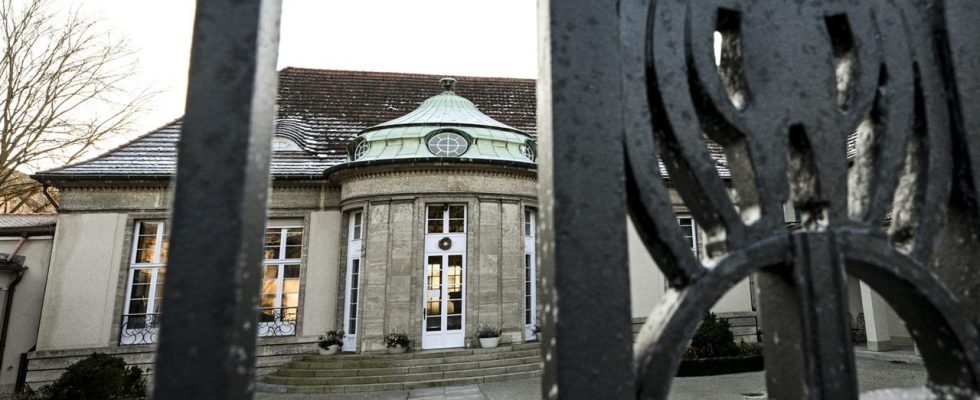exclusive
So far, the AfD has played down the “Potsdam meeting” of the right-wing extremist founder Mörig as a private event. But according to research by WDR, NDR and SZ there are more connections to the AfD than previously known.
The scandal surrounding the secret meeting revealed by the media company Correctiv at the end of November in a villa near Potsdam is moving much closer to the party leadership around AfD leader Alice Weidel. It was previously known that, in addition to an AfD member of the state parliament and an AfD member of the Bundestag, Weidel’s personal colleague Roland Hartwig also took part in the meeting in the “Landhaus Adlon”.
According to research by WDR, NDR and Süddeutscher Zeitung (SZ), however, there is apparently another participant from Weidel’s environment: Arne Friedrich Mörig, son of the organizer of this meeting with right-wing extremists, Gernot Mörig.
Another AfDBoard employee at meetings in Potsdam
According to the research, Mörig junior was paid directly from funds from the AfD federal executive committee – namely from the personal budget that Weidel has direct access to as party leader. At the meeting in Potsdam, Mörig also gave a lecture about founding a new right-wing social media agency.
Details about this agency’s plans was last published by netzpolitik.org. According to research by WDR, NDR and SZ had a contract for the AfD. He is also said to have been responsible for social media for the AfD federal executive board.
Work in the background
However, the man is not said to have been present at the federal office. He is said to have done his work more in the background. At the end of 2023, after the meeting in Potsdam and before Correctiv’s reporting, Mörig is said to have presented the plans to found an influencer agency to the AfD’s federal executive board. After the Correctiv research became known, the contract with Mörig is said to have been terminated. Weidel, Mörig, Hartwig and the AfD left questions about this unanswered.
In the wake of the scandal, Weidel had already separated from long-time AfD official Hartwig, who was also present in Potsdam, under great public pressure – “by mutual agreement,” as it was said.
Nevertheless, the party leadership repeatedly referred to the meeting in Potsdam as a “private meeting” and tried to give the impression that it had nothing to do with politics – although there are also clear indications that party leader Tino Chrupalla had already attended a meeting of Mörigs in the past Düsseldorf rounds are said to have taken part. Chrupalla had replied to “Zeit”: “I’m like Scholz, I don’t remember anything.”
According to research by Correctiv, the circle in Potsdam discussed a so-called “master plan” and fantasies were exchanged, including deportations of “unassimilated Germans” to “model states.” The research has sparked a new debate about banning the AfD party.
In the past, organizer Gernot Mörig is said to have pointed out at similar meetings that donations for the so-called Düsseldorf Forum should go through his brother-in-law’s private account. According to research, this brother-in-law is WDR, NDR and SZ also includes an AfD politician: Thomas Grebien, who is a member of the AfD district executive in the Plön district (Schleswig-Holstein).
This research is based on initial research and a tip from Greenpeace’s investigative department. Explosive: Grebien, the brother-in-law of the organizer Gernot Mörig, was once the founder and, in the 1990s, a board member of the “Heimattreuen Deutschen Jugend” (HDJ) in Plön, which was then banned in 2009.
Active in AfD despite “Incompatibility decision”
Grebien founded the association in 1990 under a different name, together with the alternative practitioner Henning Pless, who was also present at the meeting in Potsdam in November. In 2009, the Federal Ministry of the Interior banned the association – because, among other things, it spread neo-Nazi ideas among children and young people through ethnic youth camps and the targeted targeting of young people.
Proximity to the HDJ had already become a problem for the AfD in the past: When it became known in 2020 that the former state leader of the AfD in Brandenburg, Andreas Kalbitz, had attended a summer camp run by the HDJ, he was kicked out of the party shortly afterwards. The club is still on the AfD’s so-called “incompatibility list” to this day.
All of this is extremely sensitive for the AfD, which has not only been in the public eye since the Correctiv research, but also at the center of a ban debate. When asked, the district chairman of the AfD in Plön said that he was not aware of his advisor’s previous role in the HDJ or in the background of the “Düsseldorf Forum”. He did not comment on the consequences. The Federal AfD, like Thomas Grebien, also did not want to comment on the connections.

